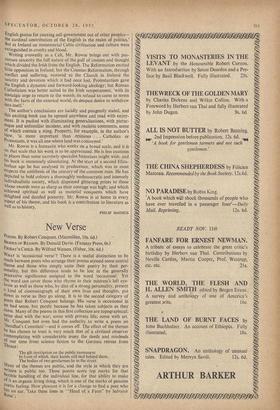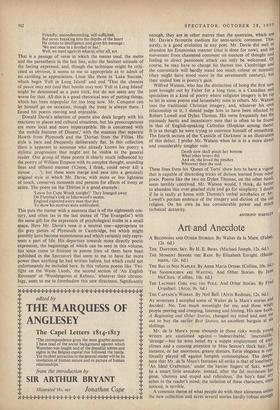New Verse
WHAT is 'occasional verse'? There is a useful distinction to be Made between poets who arrange their poems around some central theme and those who simply unite their poetry by their per- sonality, but this difference tends to be lost in the generally Pejorative significance assigned to the word 'occasional.' Yet the word can cover those who rhyme to their mistress's left eye- brow as well as those who, by dint of a strong personality, present 4 kind of cinematograph of their own lives and thoughts, put down in verse as they go along. It is to the second category of
Poets that Robert Conquest belongs. His verse is occasional in no bad sense, but purely because he has taken subjects as they came. Many of the poems in this first collection are topographical; some deal with the war; some with private life; some with art.
Mr. Conquest hat even had the audacity to write a poem on `Stendhal's Consulate'—and it comes off. The effect of the themes he has chosen to treat is very much that of a civilised observer Contemplating with considerable irony the deeds and misdeeds
Of our time from science fiction to the German retreat from Thrace: The gilt inscription on the public monument
In front of which, their hands still tied behind them, The bodies of two gendarmes lie in the street.
Many of the themes are public, and the style in which they are Written is public too. These poems score top marks for that
flexible handling of the individual line, for that ability to make of it an organic living thing, which is one of the marks of genuine Poetic feeling. How pleasant it is for a change to find a poet who has an ear. 'Take these lines in • "Head of a Faun" by Salvator Rosa,:
Friendly, uncondescending, self-sufficient, But never break in into the depths of the heart He comes to intelligence and gives his message : 'We met once in a brothel or bar.'
Well, we meet again in what is, after all, art.
That is a passage of verse in which the means used, the metre and the parenthesis in the last line, echo the hesitant attitude of the feeling expressed, and, though the technique might be criti- cised as obvious, it seems to me so appropriate as to admit of no cavilling in appreciation. Lines like those in 'Lake Success,'
which begin 'Fall in Long Island' and end 'That the chances of peace may not (and that bombs may not) 'Fall in Long Island' might be denounced as a pure trick, but do not seem any the worse for that. All this is a good rhetorical way of putting things, which has been unpopular for too long now. Mr. Conquest can let himself go on occasion, though the irony is always there. I found his poems moving and enjoyable.
Donald Davie's selection of poems also deals largely with his reactions to places and cultural situations, but his preoccupations
are more local and more imperceptible. He is concerned with 'the mobile features of Dissent,' with the nuances that separate Howth from Plymouth and the Thirties from the Fifties. His style is bare and, frequently deliberately flat. In this collection there is apparent to someone who already knows his poetry a stylistic progression that might not be visible to the general
reader. One group of these poems is clearly much influenced by the poetry of William Empson with its complex thought, sounding lines and offhand manner (`Creon, I think, could never kill a mouse . . .'), but these soon merge and pass into a genuinely original style in which Mr. Davie, with more or less lightness of touch, conserves moments and persons for effects of irony or satire. The poem on the Thirties is a good example: 'Leave for Cape Wrath tonight1' They lounged away On Fleming's trek or Isherwood's ascent. England expected every man that day To show his motives were ambivalent.
This puts the matter with a neatness that is of the eighteenth cen- tury, and often (as in the last stanza of 'The Evangelist') with the same gift for the expression of psychological truths in a small space. Here Mr. Davie's tone is a neutral one—appropriate to the grey pieties of Plymouth or Cambridge, but which might possibly have become monotonous and which certainly only repre- sents a part of life. His departure towards more directly poetic expression, the beginnings of which can be seen in this volume,
has since come to fruition in poems (two of them have been published in the Spectator) that seem to me to have far more power than anything he had written before, but which could not unfortunately be included here. In this volume poems like 'Twi- light on the Waste Lands,' the second section of 'An English Revenant' or 'Woodpigeons at Raheny,' whatever their chrono- logy, seem to me to foreshadow this new directness. Significantly
enough, they are in other metres than the quatrains, which are Mr. Davie's favourite medium for semi-satiric comment. This, surely, is a good evolution in any poet. Mr. Davie did well to
abandon his Empsonian manner (that is done for now), and his movement from chastened comment on nuances of thought and feeling to direct passionate attack can only be welcomed. Of course, he may have to change his themes too. Cambridge and the conventicle will hardly stand too much colour or intensity
(they might have stood more in the seventeenth century), but their muted loss is 'poetry's gain.
Wilfred Watson, who has the distinction of being the first new poet brought out by Faber for a long time, is a Canadian and specialises in a kind of poetry where religious imagery is let rip to hit in some poems and lamentably miss in others. Mr. Watson uses the traditional Christian imagery, and, whatever his own relationship to it, I should judge him to have been affected by Robert Lowell and Dylan Thomas. His verse frequently has the curiously hectic and incantatory note that is often to be found in that of English-speaking Catholics (Hopkins among them).
It is as though he were trying to convince himself of something. The fourth section of the 'Canticle of Darkness' is an illustration of this defect. I prefer Mr. Watson when he is in a more direct and considerably tougher vein :
Death now shall pinch her bottom What other lovers did
And oh, she loved the pinches Whatever then she said. . . .
These lines from his 'Queen of Tarts' show him to have a vigour that is capable of discarding tricks of diction learned from other
poets. Poems like the two on Dylan Thomas, on the other hand, seem terribly contrived. Mr. Watson would, I think, do better to abandon this over-gnarled style and go for simplicity. I doubt if he is really at home with Thomas's verbal acrobatics or Mr. Lowell's puritan embrace of the imagery and diction of the old
religion. On his own he has considerable power and much technical dexterity.
ANTHONY HARTLEY



































 Previous page
Previous page